Treadmill Maintenance: Rear Roller Replacement
While running on my Smooth Fitness 5.25 running treadmill in the early morning hours a week ago, the rear roller completely blew out. The Smooth Fitness 5.25 was replaced by the 5.45 and most recently the 5.65, so you may want to take note of this blog entry if you own or are considering purchase of any of these three treadmills.
It had been several months since I had regularly run on my treadmill, since I prefer the local Illinois Prairie Path and Great Western Trail that are literally only a couple blocks from my house, but now it is mid-Fall, and while afternoon temperatures might be great running weather, sub-freezing temperatures are not unlikely during the early morning hours before work when I am most likely to run.
The treadmill that I had remembered to be initially incredibly quiet had grown to be annoyingly loud in a brief period of time, so I ordered the Deluxe Treadmill Care Kit, which was only $5 more than the standard care kit (although as I soon found out, both kits are incredibly expensive at around $50 each). Following the instructions provided in the included "maintenance instruction guide" did not alleviate the loudness (there was no noticeable functional degradation).
Working through the guide, it became clear that it did not provide the same instructions as the treadmill user's manual, so I made sure to address all the points made in both documents. The initial confusion began when both documents indicated how seemingly easy the side rails can be removed from the treadmill for cleaning, with absolutely no instruction on how to perform the removal, so after some deliberation I chose the brute-force method of removal.
In other words, manually pulling the side rails from the body of the treadmill. And when I say brute-force, I am talking quite an enormous pull to remove each that left me thinking I had damaged the treadmill to a point where reattaching the side rails would not be possible, all for the purposes of cleaning and lubricating the walking belt (the surface on which one runs).
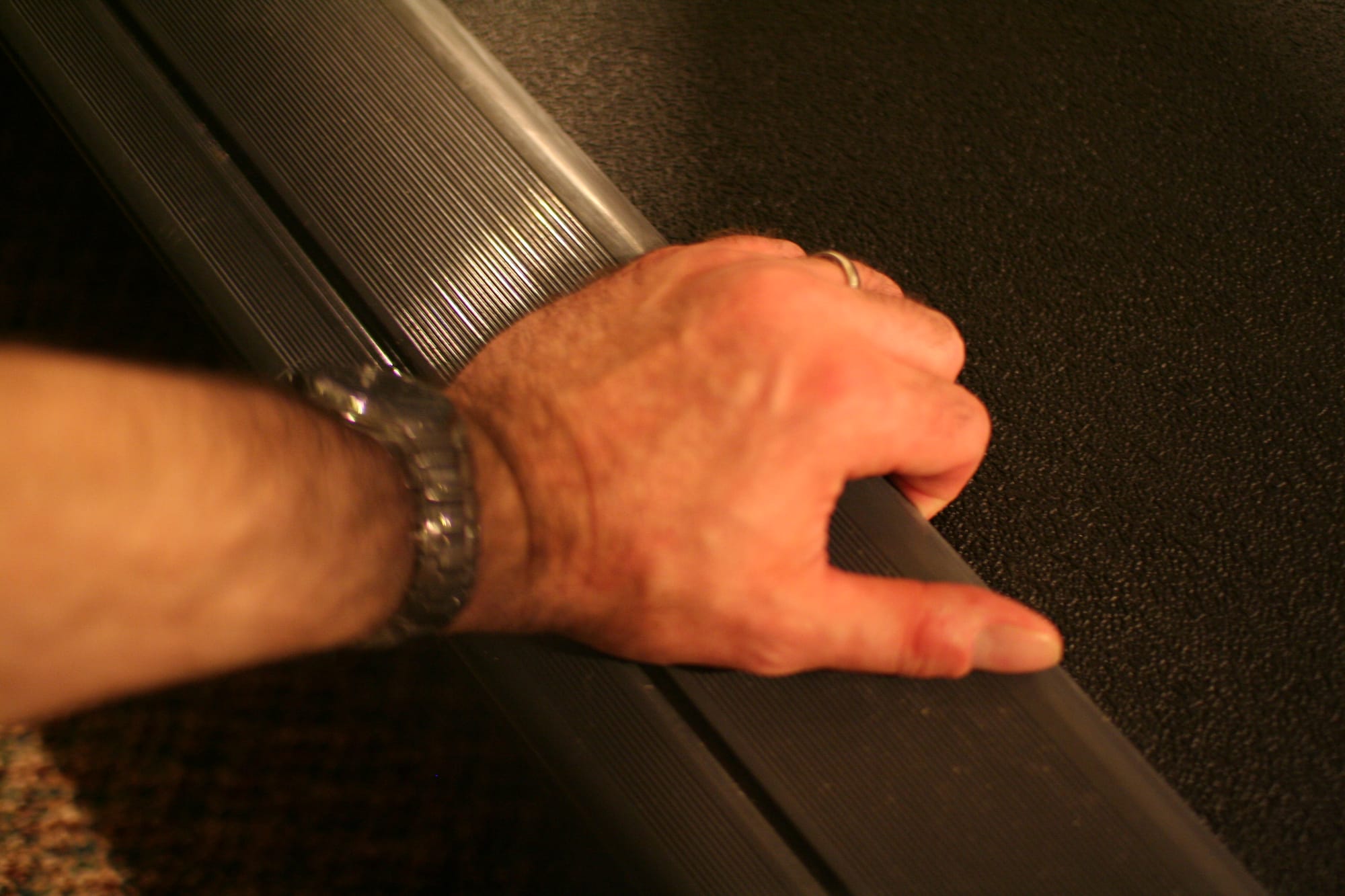
Amazingly, neither side rail broke. But cleaning and lubrication only barely lessened the noise after some test runs, even though the treadmill continued to function adequately. Interestingly enough, while both treadmill documents focused on certain aspects of treadmill maintenance, neither spoke to the root cause of the issue. After some additional test runs, the rear roller began to smoke. Nice dummy light.
For comparison, the following are shots of the original and new rollers, respectively:
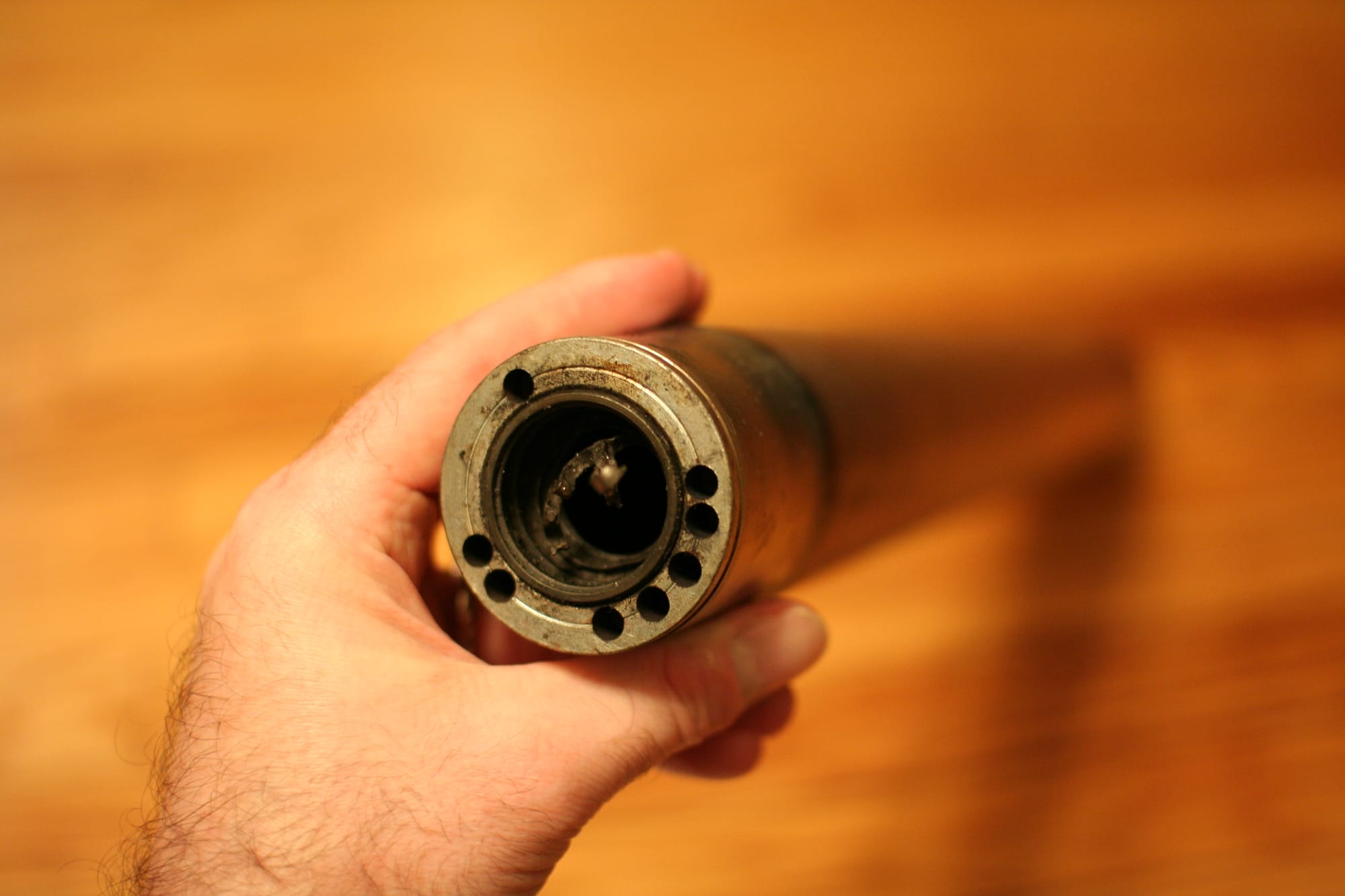
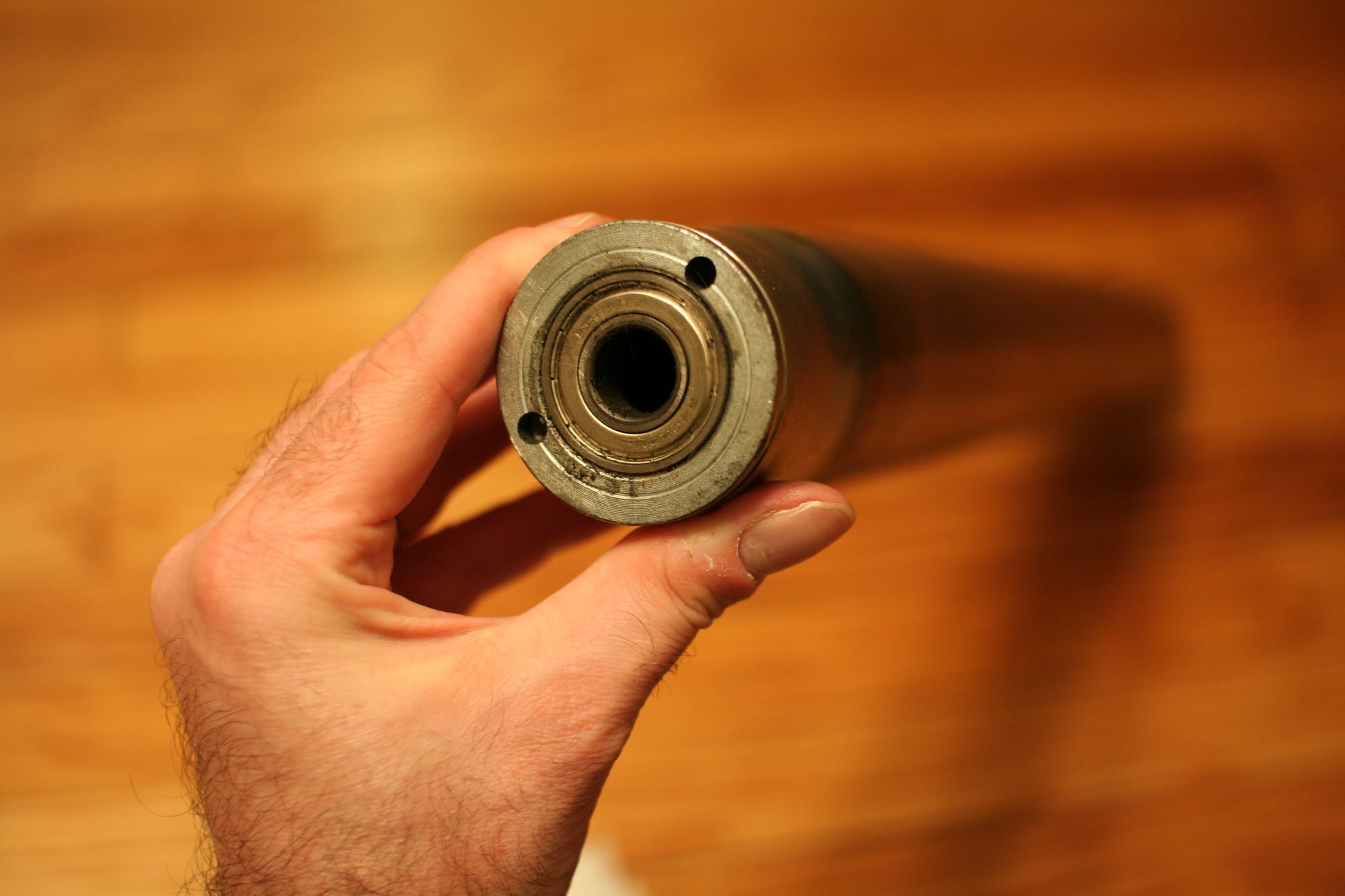
The second photo of the new roller above is actually one of three rollers purchased immediately following the blow-out. Since the blow-out occurred early on a Sunday morning, and Smooth Fitness was not open, I took a look at the alternatives available for roller replacement, and happened across an eBay auction that offered a "Buy It Now" purchase option (that negates the need for an auction), and made the purchase (consisting of both front and rear rollers) for only about $40, quite a deal especially when considering the cost of the treadmill care kit.
This purchase was followed by another attempt to contact Smooth Fitness the following day (several calls were made that Sunday because the website listed hours for every day of the week), and surprisingly, I soon found when speaking with a customer service representative that my call was being made literally a day before the end of my three-year warranty! A rear roller was sent to me free of charge, which ended up being received the same day the eBay shipment was received (Friday that same week).
Unfortunately, there are no instructions on how to replace a roller. First, the end caps need to be removed (there are two, one at each end of the rear roller). This can be performed simply with a Phillips-head screwdriver:
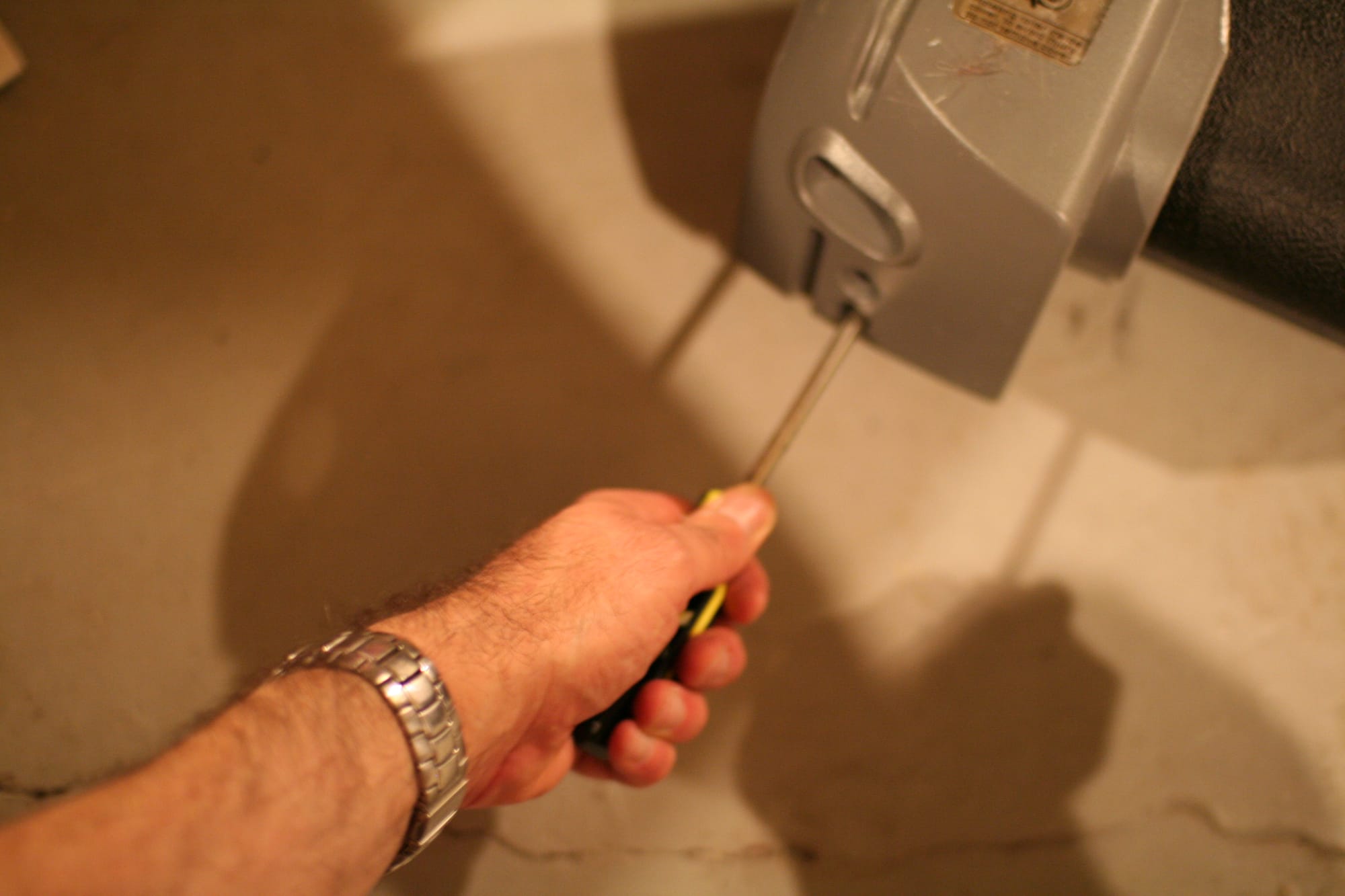
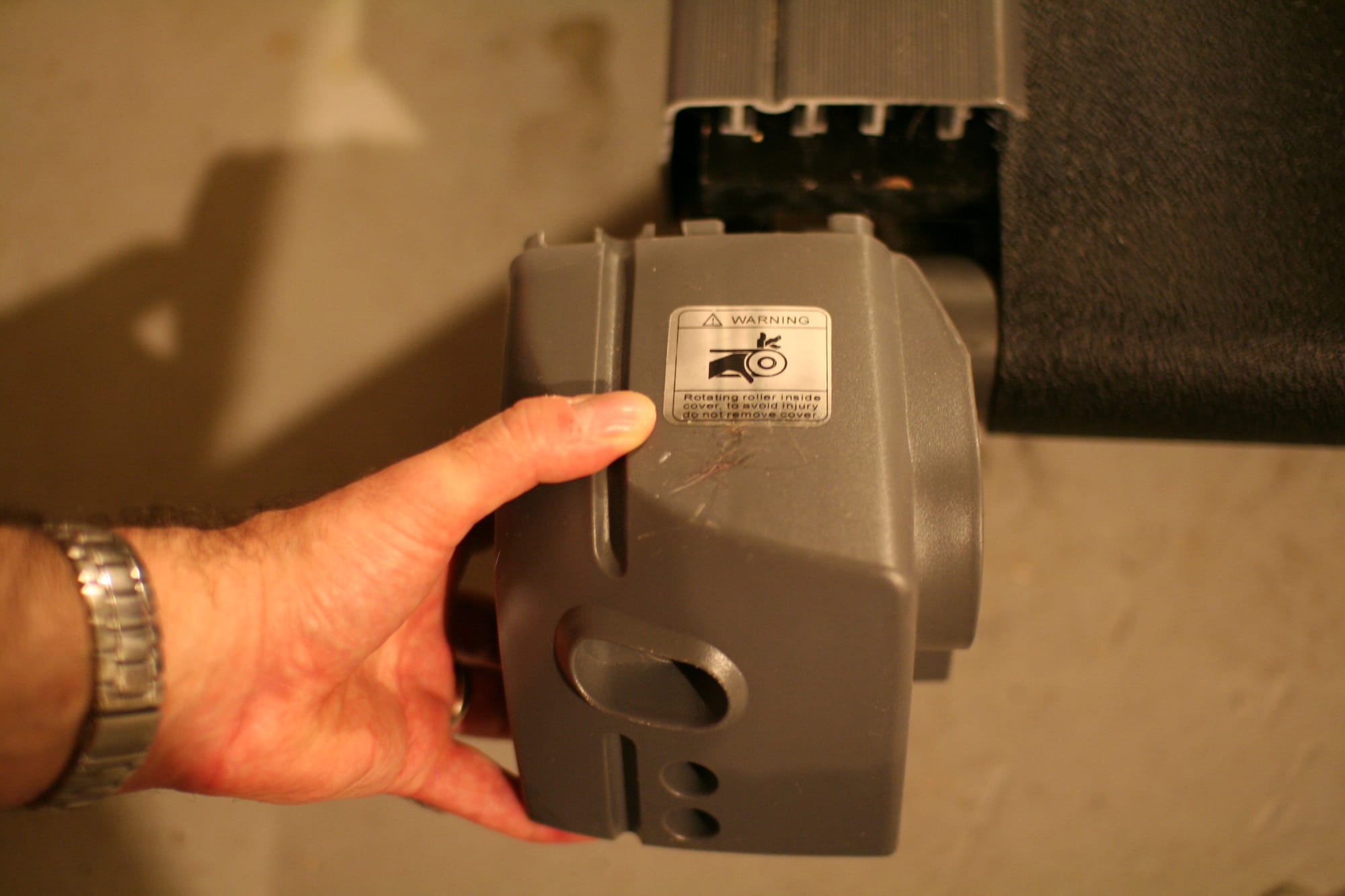
After lifting out the original roller and installing the new roller, the tightness of the walking belt needs to be tuned with a hex key (Allen wrench). In this case, the treadmill manual provided some helpful guidance by indicating that the belt should be tightened just beyond the point where it slips while in operation, and that tightening should be performed in 1/4 turn increments. So after a dozen or so iterative tightenings and test runs, I was able to get to a point where tuning was complete.

The end caps can then be replaced. The side rails can be replaced before or after tuning. The photos above were taken retroactively for this blog post since I did not want to undo the work I had performed. The benefit you might get from waiting to replace the side rails is that the walking belt might slip during testing, and it is easier to get to the walking belt when the side rails are still off.
By the way, it became quickly apparent following my brute-force removal of the side rails that they can be removed extremely easily by sliding them off following removal of the end caps. None of the Smooth Fitness documentation says anything about how to remove side rails, and the instructions that are made available by the company seem to imply that they can be removed easily without performing any other steps (such as end cap removal in this case). My hope is that you read this blog post before causing any damage.

The end result of my roller replacement is that the entry level Smooth Fitness 5.25 that I purchased three years ago is operational and incredibly quiet once again. The new rear roller I installed was the used roller I acquired via eBay, so I additionally have the replacement provided by Smooth Fitness as a backup. The same strategy is recommended to other treadmill owners. What is often true for car warranties is apparently true for treadmill warranties: issues tend to arise as soon as accompanying warranties end. Would love to hear about similar experiences from other treadmill owners.
Comments from original Typepad blog:
Snow White: did the belt feel like it was shaking or jumping when you ran/walked on it? i'm trying to diagnose my own treadmill malfunctions...
Friday, September 30, 2011 at 10:58 AM
Erik Gfesser: The treadmill in general became louder and louder over a period of a week or two, and then stopped completely. I do not recall shaking or jumping, but if your treadmill is doing so it is possible that your belt is slipping, in which case I recommend following my belt tuning instructions, but be aware that this may not be a trivial task, taking some time to complete. Also, make note that this blog post focuses on replacing a rear roller, and it is possible there are issues with your front roller. Would like to hear how everything turns out for you.
Friday, September 30, 2011 at 11:44 AM
Snow White: Thank you! I will let you know.
Friday, September 30, 2011 at 5:00 PM
Scott Adams: I'm really glad that you showed the old rollers. My treadmill stopped working right and I didn't know what was wrong with it. So I looked at my rollers and they look similar to yours. I'll probably have to order a replacement and then just replace them. Thanks for the help!
Tuesday, June 13, 2017 at 1:28 PM
Erik Gfesser: I'm glad I was able to help - thanks for taking the time to post!
Friday, June 16, 2017 at 4:04 PM
Anthony: Did smooth replace the rear roller free? We have the 5.45 and the rear roller is shot.
Sunday, August 6, 2017 at 5:15 PM
Erik Gfesser: Smooth Fitness sent the replacement free of charge, since I contacted customer service before the end of the three-year warranty period.
Sunday, August 6, 2017 at 7:46 PM
Asad: Did Smooth give any booklet on routine maintenance schedule chart or any other general maintenance method like greasing of treadmill's motor, belt and roller?
Tuesday, June 12, 2018 at 10:40 AM
Leslie V.: This is an absurd shot in the dark, but you don't by any chance still have that extra roller for your Smooth Fitness 5.25? Mine is quickly dying, the company is defunct, rollers are not available, replacing the bearings takes a tool that costs $$$, and I'm hoping that someone somewhere has a rear roller just sitting around...
Thursday, May 21, 2020 at 2:09 PM
Erik Gfesser: Hi Leslie, thanks for contacting me. Unfortunately, I ended up purchasing a new treadmill about 5 years ago, eventually disposing of both my old Smooth Fitness treadmill, and spare parts that I had been accumulating. In case you didn't see it, I wrote another related blog post separate from this one, where I commented what happened at the bottom. My new treadmill is from Precor, and I haven't had a single issue with it. At the time, I was hoping to write about my treadmill shopping experience, and comparing the two treadmills, but never ended up doing so. After reading my other post and my comments at the bottom, please let me know if you have any more questions:
https://www.erikgfesser.com/running-treadmill-maintenance-control-board-replacement-smooth-fitness-525-545-565-warranty/
Friday, May 22, 2020 at 8:17 AM